On this page
Delivering on the Ministry's priorities
Our Strategy 2022-25 has been developed with input from our ethnic communities. Each priority outlined in the strategy is accompanied by a set of actions, which together form the Ministry’s work programme.
From 1 July 2022 to 30 June 2023, we designed and delivered several key initiatives addressing each priority.

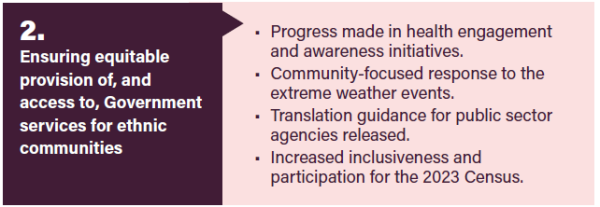
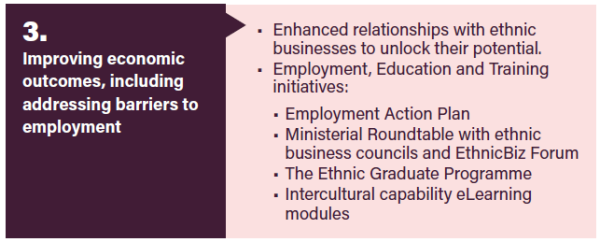

Priority 1. Promoting the value of diversity and improving inclusion of ethnic communities
Increased ethnic representation on public sector boards and committees
This year, the Ministry has taken significant steps to nominate a record number of candidates from ethnic communities to give them greater influence in government decision-making processes on matters that affect them.
We have managed a database of 245 highly qualified individuals identified from our ethnic communities. The number of nominations has increased from 117 in the last year (2021/22) to 239 this year (2022/23), which is a significant improvement.
The Ministry also made 17 endorsements for appointing ethnic candidates to 165 public sector board and committee roles.
To promote the nominations database service and support candidate’s governance capability, we have:
- Conducted five online training sessions in collaboration with other nominating agencies, such as Te Manatū mō ngā iwi ō to Moana-nui-ā-Kiwa – the Ministry for Pacific Peoples, Manatū Wāhine – the Ministry for Women, Whaikaha – the Ministry of Disabled People, and Te Puni Kōkiri – the Ministry of Māori Development.
- Dedicated one of the Ethnic Advantage conference (Auckland) sessions to discuss ‘Serving on Public Sector Boards and Committees.’
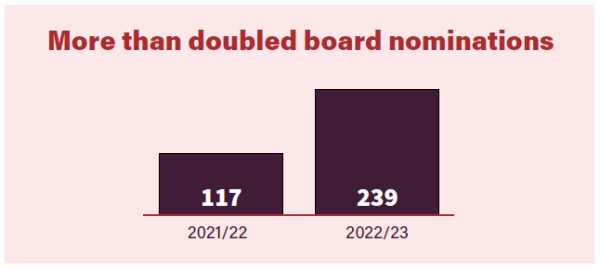
Case study one - Shed light on racism in New Zealand schools for the first time
Our aim
Reducing and eliminating racism is an integral part of the Ministry’s work and aligns with our priorities of emphasising the value of diversity and ensuring equitable outcomes for ethnic communities.
The Education Review Office (ERO), in partnership with the Ministry for Ethnic Communities, wanted to understand the education experiences of learners from ethnic communities and their whānau.
Aotearoa New Zealand is ethnically diverse and is rapidly becoming more so. Ethnic community learners are expected to make up one-quarter of students by 2043.
The study looked at how education meets the needs of our learners from ethnic communities via a Long-Term Insights Briefing.
Our role
In this study, ERO examined the education system’s impact on learners’ outcomes in ethnic communities. This informs policy development, research and public discourse.
The Ministry advised on ethnic communities and inclusion, aiding ERO by fostering community collaboration. The Ministry contributed to ERO’s research and outreach through consultations, workshops and data support.
The outcomes
In November 2022, ERO released a draft report for public consultation. The consultation document was made available in seven languages. Feedback was integrated into the final report published in March 2023, titled ‘Education for All Our Children: Embracing Diverse Ethnicities.’
Combining data from surveys, submissions, site visits and interviews, the report marks a significant milestone in addressing diverse learner experiences. It prompts consideration of education system adaptations for thriving ethnic community learners and their whānau.
What this means for all New Zealanders, including our ethnic communities
As New Zealand’s schools become more diverse, this report highlights needed opportunities for change to make New Zealand a great place to learn for children and young people from ethnic communities. The report presented several future options to achieve that. For example:
- Ending racism by setting stronger expectations on tackling it and providing clearer avenues for parents and learners to raise concerns.
- Develop the skills of teachers to adjust their teaching to meet the needs of learners from ethnic communities and how to identify and combat racism and unconscious bias.
A link to the full report is on the ERO website: Education For All Our Children: Embracing Diverse Ethnicities | Education Review Office (www.ero.govt.nz).
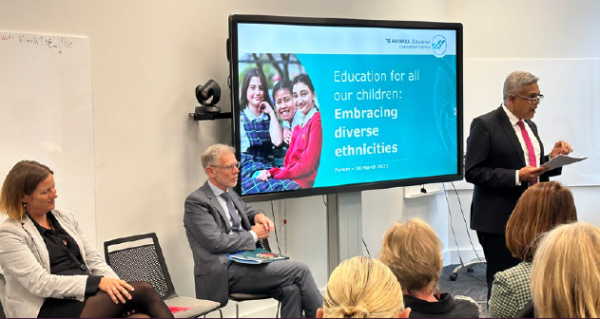
From right to left: Mervin Singham, the Chief Executive of the Ministry for Ethnic Communities speaking at the ERO report’s launch, Nicholas Pole, Chief Executive/Chief Review Officer of ERO and Ruth Shinoda, Deputy Chief Executive: Head of Te Ihuwaka | Education Evaluation Centre
Priority 2. Ensuring equitable provision of, and access to, government services for ethnic communities
Progress made in health engagement and awareness initiatives
Equitable access to health services, including mental health, is a top priority for ethnic communities.
In October 2022, our Chief Executive collaborated with the Chief Executives of Te Whatu Ora (Health New Zealand), Te Aka Whai Ora (Māori Health Authority) and Manatū Hauora (Ministry of Health) on an initiative aimed at incorporating the specific needs and perspectives of ethnic communities into health reforms for Aotearoa New Zealand.
As a result, we initiated the following:
- Pae Ora – New Zealand Health Strategy engagement workshops
Partnering with the Ministry of Health, we organised nationwide workshops for ethnic communities and health service providers to actively shape Pae Ora – the New Zealand Health Strategy. These workshops were held between February and April 2023.
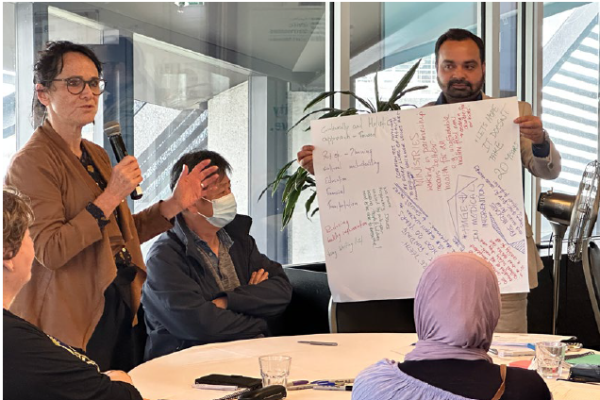
Wellington Workshop - 13 March 2023
- For Health’s Sake plenary sessions
We organised For Health’s Sake plenary sessions as part of our Ethnic Advantage conferences held in Dunedin and Christchurch in November and December 2022.
The primary objective of these sessions was to actively involve ethnic communities in shaping the evolution of health services that meet their specific needs. The sessions had over 300 attendees, and fostered discussions among community representatives, Te Whatu Ora and Te Aka Whai Ora health officials, and the audience. - Health awareness animation videos
In collaboration with the Ministry of Health, we produced a series of short, animated videos covering various health topics. These were translated into 18 languages to enhance ethnic communities’ understanding of health services available to them.
The topics included: COVID-19, men’s health, women’s health, mental health, children’s health, youth health, immunisations, older person’s health, anti-viral medicines, heart disease and diabetes.
Case study two - Community-focused response to extreme weather events
Our aim
In early 2023, the North Island experienced two severe weather events, the Auckland flooding and Cyclone Gabrielle, within a short period. The Ministry proactively worked with our ethnic communities during these challenging times, knowing that approximately 600,000 people from these communities resided in affected areas (based on Census 2018).
We aimed to provide support by linking ethnic communities and service providers with government agencies, influencing the type of support provided and ensuring it met their specific needs. We effectively communicated relevant information through webinars, email, social media, our newsletter, and our website.
Our role
We maintained communication with community leaders and service providers, relying on their first-hand knowledge of the community’s unique specific needs and access to information.
We connected ethnic communities and service providers with lead agencies for tailored assistance, including halal food and appropriate shelters.
We collaborated with 62 organisations, helping them secure funding, and facilitated translations.
The Ministry engaged with Chief Executives’ Caring for Communities forums to ensure ethnic voices and concerns were considered in decision-making.
The outcomes
Our Strategic Engagement and Partnerships advisors frequently engaged with community organisations, bridging the gap between government resources and the communities’ needs.
We also initiated hui with ethnic service providers nationwide to identify each community’s specific needs.
We launched the online Cyclone and Flooding Support Hub, a centralised platform on the Ministry’s website offering tailored information, mental health support, language assistance and business support.
What this means for all New Zealanders, including our ethnic communities
By providing a wide range of resources and building relationships with ethnic service providers, the Ministry empowered communities to better cope with emergencies and offered a sense of assurance during challenging times.
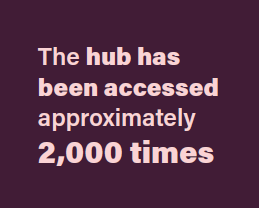 We are also committed to sustaining the value of the website hub by updating it to become the new Disaster and Emergency Support Hub. This updated version will include information and videos on emergency preparedness, as well as resources to seek assistance and support following specific emergencies.
We are also committed to sustaining the value of the website hub by updating it to become the new Disaster and Emergency Support Hub. This updated version will include information and videos on emergency preparedness, as well as resources to seek assistance and support following specific emergencies.
The new hub will serve as a permanent feature on our website, offering all New Zealanders (including ethnic communities), tailored and targeted information for emergency responses. The videos will be available in 20 languages, making them accessible to many of our communities.
Our ongoing commitment to supporting ethnic communities during crises underscores our dedication to the wellbeing, inclusion and equitable support for all communities throughout New Zealand, fostering resilience and cohesion.
The Hub was accessed approximately 2,000 times from its launch until 30 June 2023.
Unlocking language barriers – our translation guidance for public sector agencies
The Ministry developed comprehensive guidance to assist government agencies in understanding translation processes, making informed decisions about language selections, and improving communications distribution to culturally and linguistically diverse communities.
Ensuring that information is available in languages and formats accessible to diverse communities, and disseminating it through channels where they seek information, is essential to enhancing awareness and accessibility of government services for ethnic communities. This directly aligns with Priority 2 of the Ministry’s Strategy.
This guidance is the result of collaboration with other government agencies, including Te Tari Taiwhenua – the Department of Internal Affairs, Te Manatū mō Ngā Iwi o Te Moana-nui-a-Kiwa – the Ministry for Pacific Peoples, and Te Taura Whiri i te reo Māori – the Māori Language Commission. It also includes insightful case studies from the Department of the Prime Minister and Cabinet (DPMC), Immigration New Zealand (INZ) and the National Emergency Management Agency (NEMA).
The need for this guidance was evident from the numerous requests to the Ministry and the Department of Internal Affairs Translation Service from other government agencies seeking advice on which languages to translate their information into.
We are committed to keeping the guidance up to date.
The translation guidance is comprised of three parts:
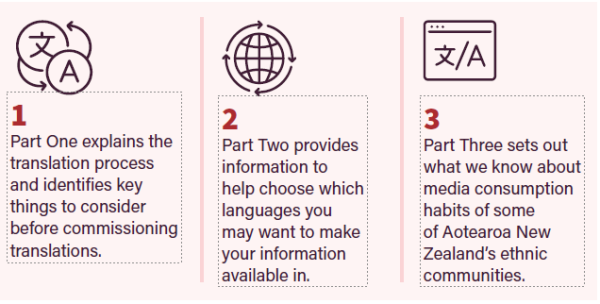
Increased inclusiveness and participation for the 2023 Census
The Ministry played a significant role in making the 2023 Census inclusive and community-focused.
We worked in partnership with Tatuaranga Aotearoa – Stats NZ and their Census team to make the Census process accessible and supportive for our communities.
One of the key activities was providing information in 27 languages on the 2023 Census website. This allowed individuals with diverse language needs to participate effectively in the Census.
Engaging with our communities was crucial in understanding their unique requirements. We identified specific areas where support was needed, such as in Invercargill, where we connected the community with the Census team to establish assistance stations at the Invercargill Central Library.
To keep our communities informed about the Census, we utilised various platforms, including newsletters and social media channels. We also collaborated with ethnic leaders to record video messages in their mother tongues, emphasising the importance of participating in the Census.
Priority 3. Improving economic outcomes, including addressing barriers to employment
Case Study three - Enhanced relationships with ethnic businesses to unlock their potential.
Our aim
At the Ministry, we aim to foster an inclusive and thriving economy by unlocking the potential of ethnic businesses in Aotearoa New Zealand. We believe embracing diversity and actively supporting ethnic businesses will create a more coherent and productive economic landscape.
Our role
In line with the Ministry’s priorities, we have implemented further measures to bolster the economic empowerment of our ethnic communities and businesses.
In April 2023, we organised a Ministerial Roundtable, bringing together leaders from business councils, ethnic business communities and relevant ministers.
Less than a month later, our first EthnicBiz Forum was held in May. The Forum saw an excellent turnout with more than 100 participants, and served as a valuable two-way communication channel between government officials, business leaders and associations, academia, and business owners.
The Forum’s speakers, panelists, and attendees contributed to its success. Sponsors included the Bank of New Zealand (BNZ) and the Auckland Business Chamber of Commerce.
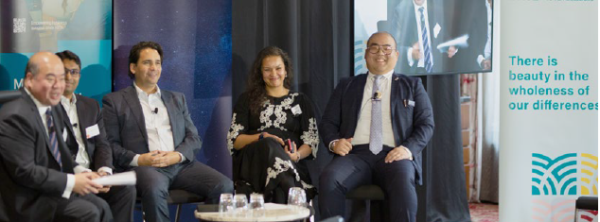
From our first EthnicBiz Forum – 23 May 2023
The outcomes
The Ministerial Roundtable and EthnicBiz Forum yielded positive outcomes, developing relationships and connections with the ethnic business community.
The Forum highlighted the significant contribution of ethnic businesses to the Auckland economy, representing approximately 30 percent or $33 billion (Auckland Policy Office report, June 2022). It emphasised the growing role of ethnic communities in shaping Aotearoa New Zealand’s socioeconomic fabric.
The Ministry also received positive feedback from those who attended both the Roundtable and the Forum. One of the comments was ‘The Forum was well-organised and informative. I enjoyed the panel discussions as they were impactful. Good Forum to meet and discuss ideas.’
- 40 ethnic businesses took part in the first Ministerial Roundtable.
- Over 100 attended the first Ethnic Business Forum.
- Out of the participants who filled in the feedback survey:
- 93.24 percent said they were satisfied with the EthnicBiz Forum event
- 93.33 percent said they would consider attending another EthnicBiz Forum or similar events in the future.
What this means for all New Zealanders, including our ethnic communities
By creating an inclusive environment where ethnic businesses can thrive, we contribute to building a cohesive and thriving economy that benefits all New Zealanders.
Our ongoing initiatives and discussions with key stakeholders reinforce our commitment to promoting the value of diversity and supporting the economic growth of ethnic communities.
Employment, education and training initiatives
Ethnic Communities Graduate Programme
The Ethnic Communities Graduate Programme is an integral part of the Former Refugees, Recent Migrants, and Ethnic Communities Employment Action Plan, representing a significant initiative that has proven successful over the last four years.
During the year, we continued with intake two of the programme and confirmed the establishment of intake three.
Intake two has ran from February 2022 to August 2023. It consisted of 14 graduates across 10 public sector agencies.
Intake three will involve the Ministry recruiting 16 graduates who will be placed with six agencies. These agencies include Inland Revenue, the Ministry of Transport, the New Zealand Customs Service, the New Zealand Intelligence Community, the New Zealand Police and the Public Service Commission.
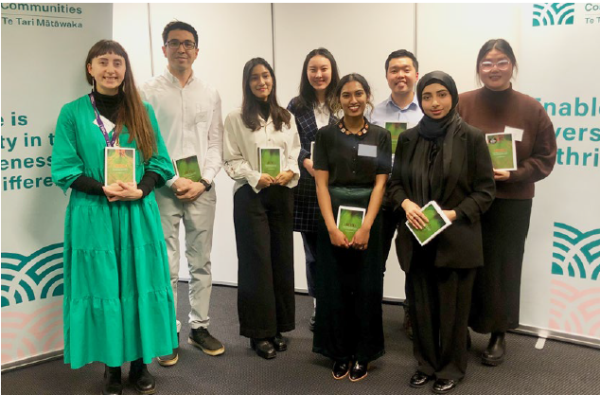
The second intake of our Ethnic Communities Graduate Programme
Employment Action Plan
We are involved in the Former Refugees, Recent Migrants, and Ethnic Communities Employment Action Plan, launched on 25 March 2022, which falls under the Aotearoa New Zealand’s Employment Strategy.
This action plan requires collaboration between the Ministry for Ethnic Communities, the Ministry of Social Development, the Ministry of Business, Innovation, and Employment (especially Immigration New Zealand – INZ), the Ministry for Women and the Ministry of Education. The plan focuses on addressing employment barriers faced by former refugees, recent migrants and individuals from ethnic communities.
Intercultural Capability eLearning Module
This year, we undertook initiatives to enhance the intercultural capability of agencies and employers
to break some barriers to ethnic communities’ employment. This included updating our eLearning modules on the Ministry’s website.
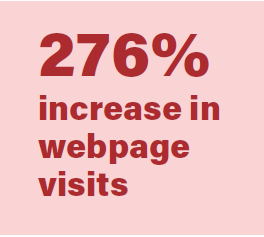 Our Intercultural Capability eLearning Module promotes the benefits of ethnic diversity and increases people’s cultural understanding, enabling them to better interact and communicate with people from different backgrounds.
Our Intercultural Capability eLearning Module promotes the benefits of ethnic diversity and increases people’s cultural understanding, enabling them to better interact and communicate with people from different backgrounds.
Following the module update and promotion, we observed a 276 percent increase in webpage visits.
To ensure the modules remain relevant and practical, we plan to update them again with Census 2023 data and incorporate any changes based on feedback received from learners.
Priority 4. Connecting and empowering ethnic community groups
Empowered ethnic communities via funding support
We recognise the abundance of capabilities and skills within our ethnic communities. To provide genuine support, the Ethnic Communities Development Fund (ECDF) plays a vital role in enabling communities to grow their skills, celebrate their culture and take part in society.
During the 2022/23 financial year, $4.2 million of funding was distributed across over 408 projects.
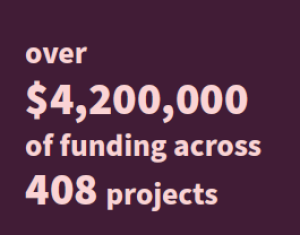 In a notable development, the Ministry added the management of the ECDF to its core functions. The Ministry reviewed this function in 2022/23 and then worked with Hapai Hapori to transition the management and administration of the fund to the Ministry for the 2023/24 year.
In a notable development, the Ministry added the management of the ECDF to its core functions. The Ministry reviewed this function in 2022/23 and then worked with Hapai Hapori to transition the management and administration of the fund to the Ministry for the 2023/24 year.
Operating the fund in-house will enable closer alignment between the needs of ethnic community groups applying for funding and the priorities outlined in the Ministry’s Strategy.
The following are examples of the positive impact ECDF made for our ethnic communities:
Visual Arts Project – Auckland
This project showcased the value of diversity and improved the inclusion of ethnic communities.
The ECDF provided funding to five talented creative practitioners from diverse ethnic backgrounds who developed captivating works of art, exploring transcultural spaces, and delving into themes of identity and culture in Aotearoa New Zealand. The result was a three-week public exhibition that showcased their impressive creations.
Women’s Development Programme – Christchurch
This initiative focused on enhancing the wellbeing and personal growth of ethnic women. It offered diverse free weekly programmes and activities, to foster social connections and intergenerational and intercultural dialogue and empower women to participate actively in their communities.
Parliamentary events
Throughout this year, the Ministry has assisted in organising a diverse range of parliamentary events and cultural celebrations, including Eid, Diwali and Chinese New Year. Approximately 1,200 individuals attended, representing various ethnicities, alongside members of Parliament, members of the diplomat corps and government officials.
A striking aspect of these gatherings was witnessing individuals from diverse backgrounds mingling and sharing their traditions and stories, fostering a profound cultural exchange and enrichment.
Organised at Parliament, these celebratory occasions held immense meaning for participants, nurturing a strong sense of belonging and solidarity within the broader society. They played a pivotal role in extending a warm welcome to all ethnic New Zealanders, making them feel at ease and at home, while simultaneously offering the wider population the opportunity to embrace other cultures.
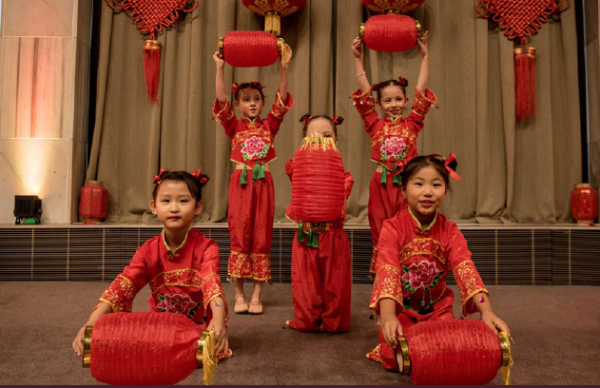
From the Parliament Chinese New Year celebration – February 2023
Cultural Kōrero 2023 – Auckland: Celebrating diversity in the arts
The Ministry organised the Cultural Kōrero event in Auckland in May 2023 to promote the diversity of the creative and performing arts sectors in Aotearoa New Zealand.
The event served as a platform for representatives from the creative arts sector and various ethnic communities to come together, explore shared experiences, and discuss challenges in the vibrant arts field.
The event featured a variety of speeches, performances and an exhibition. The event also featured a Taonga Pūoro performance by musician Rob Thorne, who later joined Māori and Indian artists in a captivating finale.
A highlight of the Cultural Kōrero was the official launch of Professor Edwina Pio ONZM’s new book, Aotearoa & Bharat Māori-Indian, released by the Ministry earlier in 2023. As Aotearoa New Zealand’s first Professor of Diversity, she presented an excerpt from her book. Professor Pio delved into the early connections between Māori and Indians, the themes that unite them, and the inspiring stories of individuals with Māori and Indian heritage.
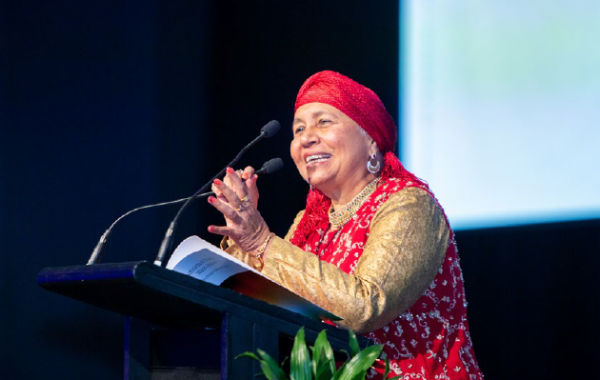
From Professor Edwina Pio’s speech at the Cultural Kōrero event – 12 May 2023
Ethnic Women’s Empowering Leadership and Voice Hui
In March 2023, the Ministry organised the Ethnic Women’s Empowering Leadership and Voice Hui at the Jubilee Hall in Parnell. This event brought together around 30 attendees from across the country, both in person and online, for a pan-ethnic women’s gathering. The purpose of this hui was to create a platform for ethnic women leaders to connect and share their ongoing leadership journeys.
The event proved to be a valuable platform for empowering and amplifying the voices of ethnic women leaders, encouraging a shared journey of growth and leadership within the community.
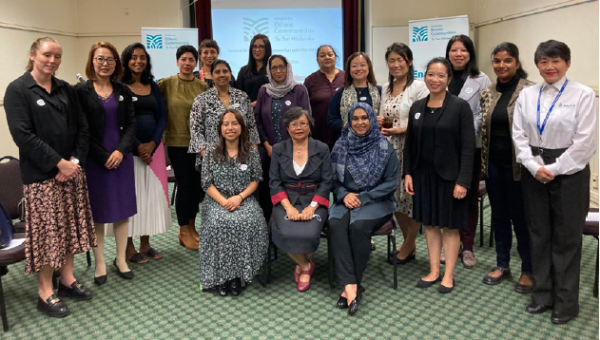
A group photo from the Ethnic Women’s Empowering Leadership and Voice Hui – 21 March 2023
Case study four - Ethnic Advantage Conferences: Celebrating diversity, uniting Aotearoa New Zealand
Our aim
This year, the Ministry introduced its Ethnic Advantage conference series to provide people from diverse ethnic backgrounds with a platform to connect, inform and grow together.
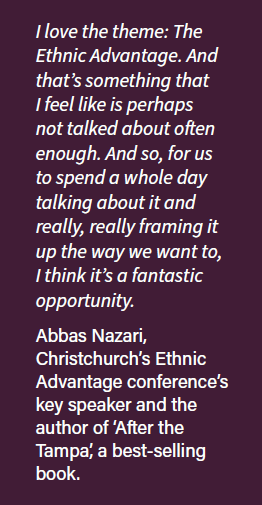 During the 2022/23 financial year, the Ministry organised three conferences – Ōtepoti Dunedin in November 2002, Ōtautahi Christchurch in December 2023 and Tāmaki Makaurau Auckland in May 2023.
During the 2022/23 financial year, the Ministry organised three conferences – Ōtepoti Dunedin in November 2002, Ōtautahi Christchurch in December 2023 and Tāmaki Makaurau Auckland in May 2023.
These events aimed to celebrate and recognise the significant contributions of ethnic communities to the socioeconomic landscape in Aotearoa New Zealand.
Our role
As an organiser and facilitator of these conferences, the Ministry created a comprehensive programme of significant topics and an inclusive, inspiring environment where representatives from various ethnic communities and government organisations could come together.
The conferences and the topics they discussed align with our four Strategy priorities.
The outcomes
Participants expressed gratitude for the opportunity to connect with others from diverse backgrounds, share their cultural heritage, and engage in meaningful conversations on important topics.
Keynote speakers, panel discussions and breakout sessions covered various themes – diversity, equity, inclusion, funding tips and cultural competence.
They also gained insights into the challenges faced by ethnic communities and explored avenues for progress and collaboration.
What this means for all New Zealanders, including our ethnic communities
The Ethnic Advantage conferences aimed to highlight the contributions of our ethnic communities to Aotearoa New Zealand and the value their diversity adds.
The outcomes of these conferences positively impact all New Zealanders, promoting a culture of respect, appreciation, and cooperation where every individual feels heard, valued and included.
- Over 500 participants.
- Out of the participants who filled in the feedback survey, an average of almost 90 percent were satisfied with the experience the conferences provided. The same average percentage said they would consider attending another Ethnic Advantage conference in the future.
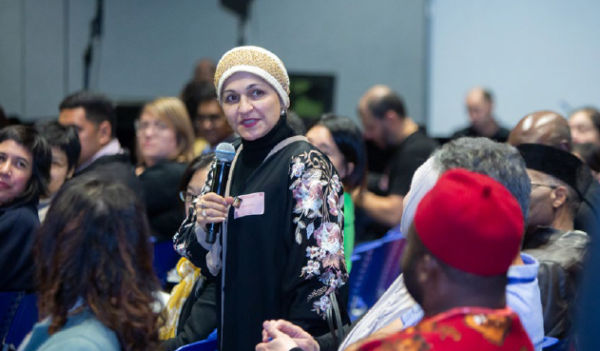
From one of the breakout sessions discussions – Ethnic Advantage conference, Auckland – 13 May 2023
Awards
Te Hāpai Hapori – Spirit of Service Awards
Te Hāpai Hapori – Spirit of Service Awards 2022 acknowledged the Ministry’s contributions to the public sector, earning us three awards:
Prime Minister’s Award for the Care in the Community Welfare Response
This award recognised the Ministry’s efforts in collaborating with other agencies to safeguard the public from the challenges posed by COVID-19. This joint agency response ensured the provision of essential welfare, health support and food to those in need during the pandemic.
Better Outcomes Award for the Afghanistan Resettlement Response
The Ministry’s joint agency response was honoured with the Better Outcomes Award for exemplary work in facilitating the safe arrival and resettlement of more than 1,700 evacuees from Afghanistan into Aotearoa New Zealand.
Special Commendation for Policy Excellence
The Strategy and Policy COVID-19 Group within the Ministry was awarded a special commendation for their outstanding contributions in providing robust system-level advice. The dedication required to translate policy into legislation promptly during the COVID-19 crisis was recognised and appreciated.
